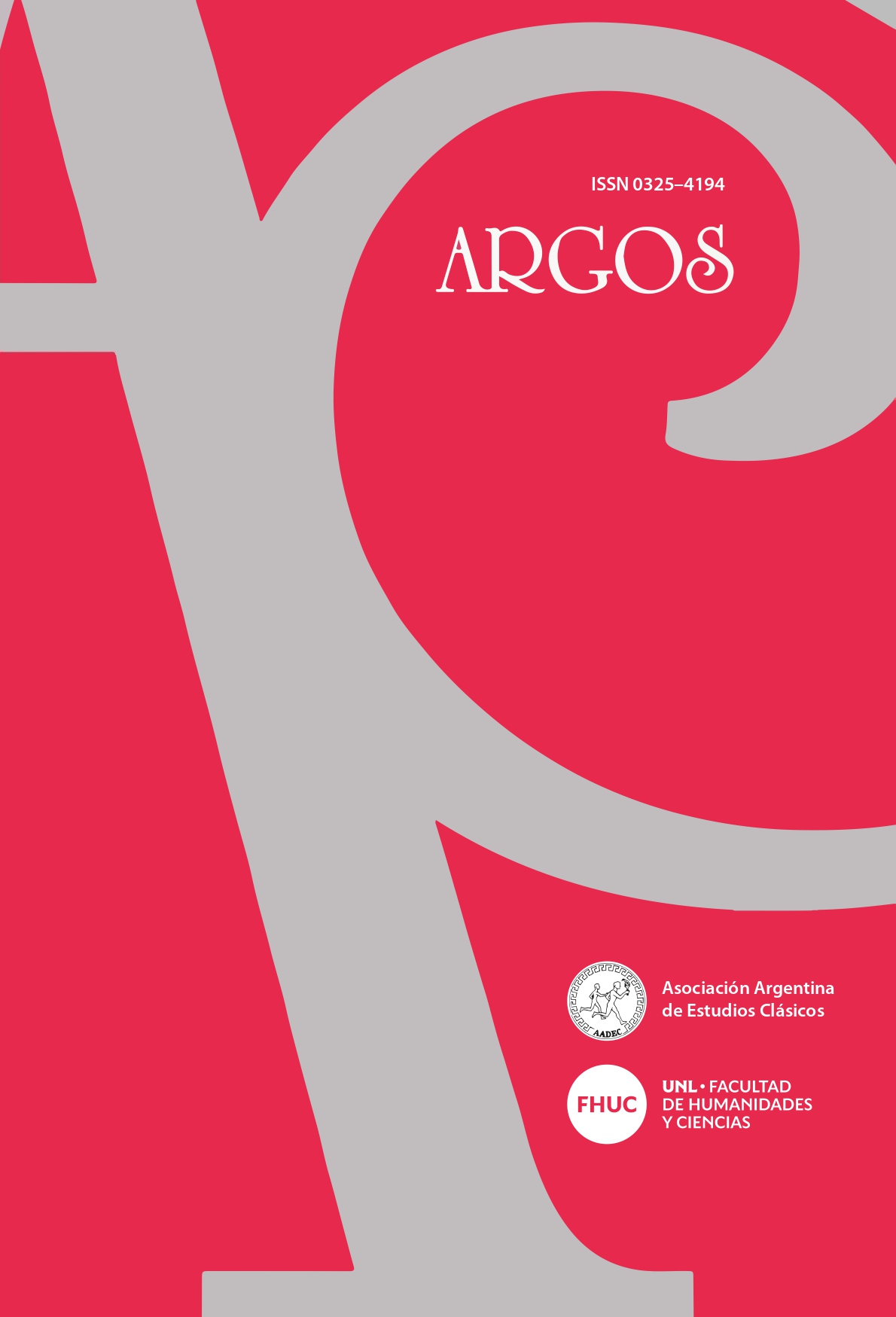εὐεργεσία, εὐεργέτης y εὐεργετέω EN SEPTUAGINTA Y EN EL NUEVO TESTAMENTO
DOI:
https://doi.org/10.14409/argos.2023.49.e0052Keywords:
euergesía, euergétes, euergetéo, Septuagint, New TestamentAbstract
The noun euergesía can be traced back to Homer and found in several classical authors. However, it is resignified along with the verb euergetéo in the Septuagint, where both are mostly applied to God. In the Hellenistic period, euergétes is frequently used as a title of sovereigns and prominent personalities, and all three words acquire a distinctive nuance in the New Testament. This article will analyze the meanings of these terms within their contexts of use in the Septuagint and in the NT, aiming to inquire the process of resemantization they underwent, which allows to posit that they have clearly gained a religious and theological sense in these texts.
References
Bibliografía
Ediciones
COLSON, F. H. & WHITAKER, G. H. (Eds.) (1929-1962). Philo, vols. I-X. Heinemann.
JONES, H. S. (Ed.) (1942). Thucydidis Historiae, vol. I. Oxford University Press; Oxford Classical Texts.
MA, J. (1999). Epigraphical DossierLetter of Laodike III to Iasians (c. 196). Antiochos III and the Cities of Western Asia Minor. Oxford University Press.
NIESE, B. (1895). Flavii Iosephi opera. Apvd Weidmannos.
RAHLFS, A. (1971 [1935]). Septuaginta. Deutsche Bibelgesellschaft.
WESTCOTT, B. F. & HORT, F. J. A. (1885). The New Testament in the original Greek. Harper & brothers.
Estudios
BARDET, S. (2012). Flavius Josèphe et l’évergétisme: un regard juif sur un échange perverti. Kentron 28, pp. 89-110.
BATTEN, A. (2004). God in the letter of James: patron or benefactor? New Testament Studies 50, pp. 257-272.
FERNÁNDEZ MARCOS, N. (2008). Septuaginta. La Biblia griega de judíos y cristianos. Ediciones Sígueme.
FERNÁNDEZ MARCOS, N. y SPOTTORNO DÍAZ-CARO, M. V. (Coords.) (2008). La Biblia griega. Septuaginta, vol. I: El Pentateuco. Ediciones Sígueme.
GAUTHIER, P. (1985). Les cités grecques et leurs bienfaiteurs (IVe-Ier siècle avant J.-C.). Contribution à l’histoire des institutions. Editions de Boccard.
GYGAX, M. D. (1994). Evergetismo e historia: Paul Veyne y Philippe Gauthier comparados. Prometheus 20, pp. 119-134.
GYGAX, M. D. (2016). Benefaction and rewards in the ancient Greek cities. The origins of euergetism. Cambridge University Press.
HARRISON, J. R. (2020). The Historical Jesus as Social Critic: A Comparison of ‘Q’ Traditions (Matt 5:43-48; Lk 6:27-36) en Darrell Bock (Author), Peter G. Bolt y James R. Harrison (Eds.) The Impact of Jesus of Nazareth: Historical, Theological, and Pastoral Perspectives, chap. 6. Sidney College of Divinity Press.
KARAVITES, P. (1980). ‘Euergesia’ in Herodotus and Thucydides as a Factor in Interstate Relations. Revue internationale des droits de l'antiquité 27, pp. 69-79.
MARTÍN, J. P. (1986). Filón de Alejandría y la génesis de la cultura occidental. Editoriales Depalma.
MARTÍN, J. P. (Dir.) (2009). Introducción general. Filón de Alejandría. Obras completas, vol. I, pp. 9-91. Trotta.
MCGILLIVRAY, E. (2009). Re-evaluating patronage and reciprocity in Antiquity and New Testament Studies. Journal of Greco-Roman Christianity and Judaism 6, pp. 37-81.
PASSONI DELL’ ACQUA, A. (1976). Euergetes Aegyptus 56(1/4), pp. 177-191.
PIÑERO, A. (Ed.) (2021). Los libros del Nuevo Testamento. Traducción y comentario.Trotta.
PLÁCIDO, D. (2017). La crisis de la ciudad clásica y el nacimiento del mundo helenístico. Miño y Dávila.
PÒRTULAS, J. (2007). Introducción y traducción de la Carta a Aristeas de Filócrates. 1611. Revista de Historia de la Traducción 1. Disponible on line en: www.traduccionliteraria.org/1611/esc/biblia/aristeas.htm [consulta: 21/05/2023]
RAMSEY, G. (2011). The Queen and the City: Royal Female Intervention and Patronage in Hellenistic Civic Communities. Gender & History 23 (3), pp. 510-527.
UWAEGBUTE, K. I. y ODO, D. O. (2021). Ancient patronage: A possible interpretative context for Luke 18:18-23? HTS Teologiese Studies/Theological Studies 77 (1), pp. 1-16.
VAN WEES, H. (2020). Heroic Benefactors? The Limits of Generosity in Homer. Gygax, M. D. y Zuiderhoek, A. (Eds.) Benefactors and the Polis. The Public Gift in the Greek Cities from the Homeric World to Late Antiquity, pp. 15-43. Cambridge University Press.
VEYNE, P. (1990 [1976]). Bread and Circuses. Historical Sociology and Political Pluralism. Trad. Brian Pierce. Viking Press.
WASSERSTEIN, A. y WASSERSTEIN, D. J. (2006). The Legend of the Septuagint. From Classical Antiquity to Today. Cambridge University Press.
ZUIDERHOEK, A. (2017). What Should Jesus Do? How Not to Go Around and Do Good in the Greco-Roman World.Verheyden, J. y Kloppenborg, J., (Eds.). Luke on Jesus, Paul and Christianity: What Did He Really Know?, pp. 243-256. Peeters.
Instrumenta
CHANTRAINE, P. (1968). Dictionnaire étymologique de la langue grecque. Klincksieck.
Downloads
Published
How to Cite
Issue
Section
License
Copyright (c) 2024 Argos

This work is licensed under a Creative Commons Attribution-NonCommercial-ShareAlike 4.0 International License.



